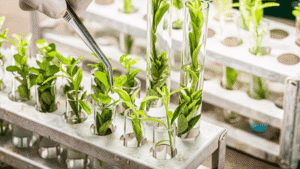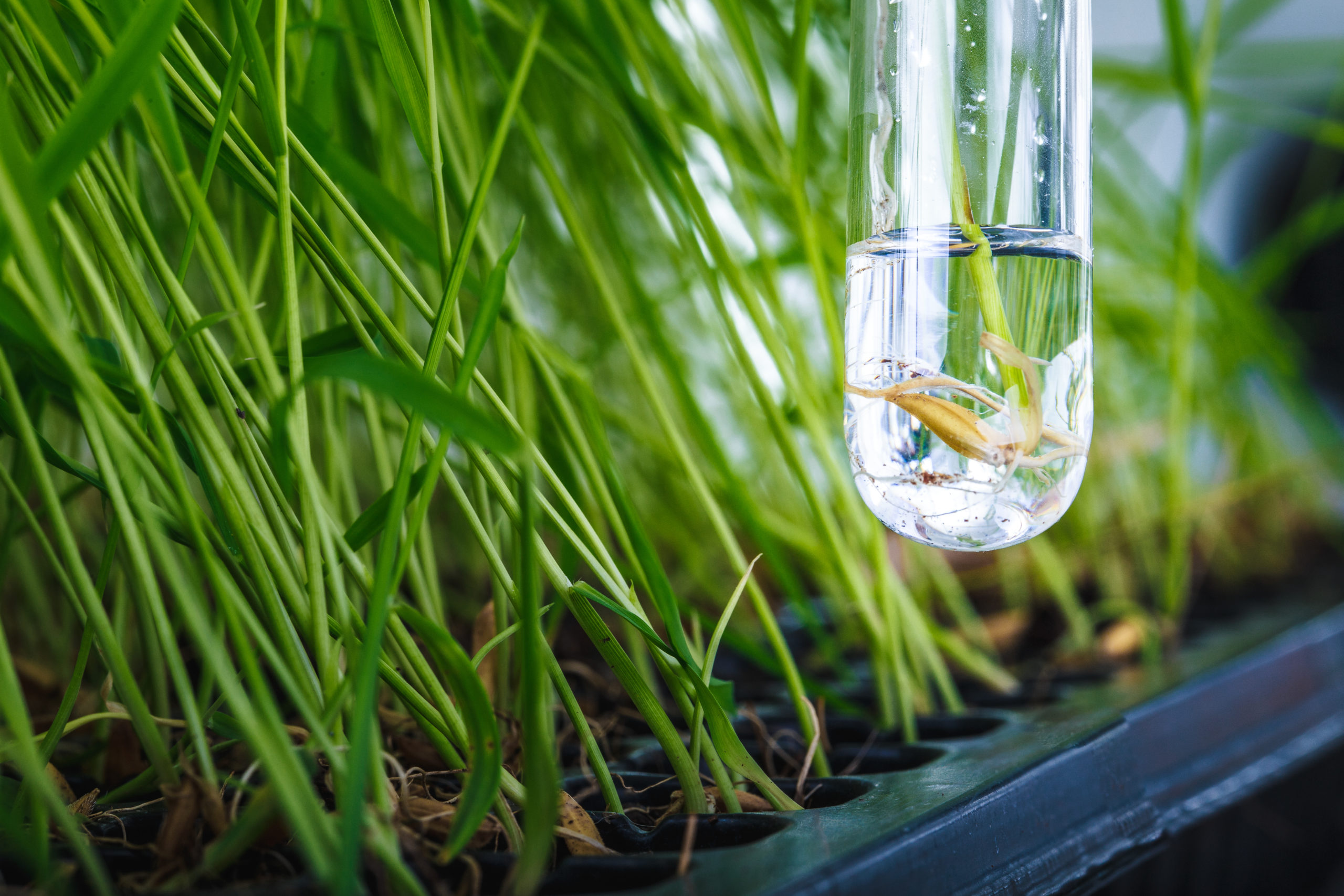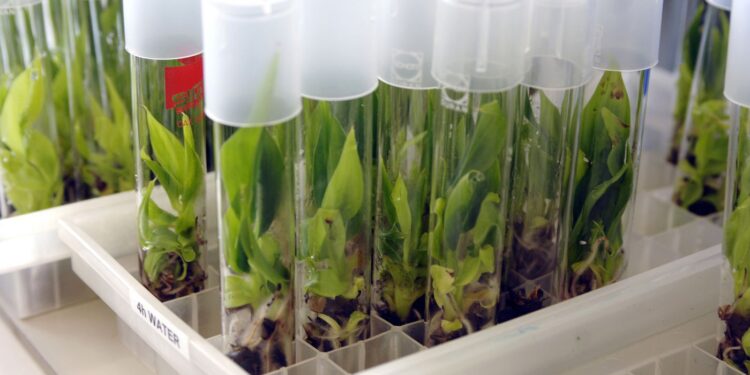Crop breeding and genetic engineering are two important tools that are used to improve the productivity and quality of crops. With the world’s population projected to reach 9.7 billion by 2050, it is crucial that we find ways to increase food production to meet the growing demand for food.
Crop Breeding
Crop breeding is the process of improving the characteristics of crops through selective breeding. This involves selecting plants with desirable traits and breeding them to produce offspring with those traits. Crop breeding has been used for thousands of years to produce crops that are better suited to local growing conditions and have improved yields and resistance to pests and diseases.
Crop breeding is the process of developing new varieties of plants that have desirable traits, such as increased yield, disease resistance, and improved nutritional content. It involves the selection and crossing of plants with desirable traits to produce offspring with improved characteristics.

Breeding can be done through traditional methods, such as selecting plants with desirable traits and crossing them to produce offspring with a combination of these traits, or through more advanced methods such as genetic engineering and mutation breeding.
Traditional breeding has been used for thousands of years to improve crops and has been essential for the development of the agriculture industry. The process involves the selection of plants with desirable traits, such as high yield, disease resistance, or improved nutritional content, and crossing them to produce offspring with a combination of these traits.
In recent decades, advances in genetics and biotechnology have led to the development of new crop breeding methods, such as genetic engineering and mutation breeding. These methods allow for more precise control over the traits that are being introduced into crops and can be used to introduce new traits more quickly and efficiently than traditional breeding methods.
Overall, crop breeding plays an important role in the development of new, improved varieties of crops that are better suited to meet the challenges of modern agriculture, such as climate change, increasing demand for food, and a growing population.
With advances in modern techniques, such as molecular markers and gene editing, crop breeding has become much more precise and efficient. For example, molecular markers can be used to identify plants with specific desirable traits, such as disease resistance, without the need for extensive field trials. This allows breeders to produce new crop varieties more quickly and efficiently.
Gene Editing
Gene editing is a newer technology that allows scientists to make precise changes to the DNA of crops. This can be used to improve crop characteristics, such as yield, disease resistance, and drought tolerance. Gene editing also has the potential to eliminate traits that are undesirable, such as allergens in crops.
Genetic engineering in agriculture refers to the process of altering the DNA of plants and animals to produce specific desirable traits. This technique is used to enhance various aspects of agriculture, such as increased crop yields, improved resistance to pests and diseases, enhanced nutritional content, and improved tolerance to environmental stress.
In agriculture, genetic engineering is typically accomplished through the transfer of genes from one organism to another. This is done using tools such as recombinant DNA technology and CRISPR/Cas9 gene editing. The new genes can come from the same species, a closely related species, or even from a completely different species.

The benefits of genetic engineering in agriculture include increased food production, improved food quality and safety, and reduced use of pesticides and other agrochemicals. However, there are also concerns about the potential environmental impacts and ethical implications of this technology.
Overall, genetic engineering in agriculture remains a complex and controversial issue, with advocates highlighting the potential benefits and opponents raising concerns about the long-term impacts on the environment and human health.
The Future of Crop Breeding and Genetic Engineering
The future of crop breeding and genetic engineering is promising, with many new technologies and techniques under development that are expected to have a significant impact on the productivity and quality of crops. Some of the key trends and developments in this area include:
- Increased Use of Gene Editing: Gene editing is becoming increasingly popular as a tool for improving crops, and this trend is expected to continue in the future. With advances in gene editing technology, scientists are able to make more precise changes to the DNA of crops, and this is leading to the development of new crop varieties with improved yields, disease resistance, and drought tolerance.
- Development of Climate-Resilient Crops: Climate change is one of the biggest challenges facing the world today, and it is having a significant impact on crop production. To address this challenge, scientists are developing crops that are more resilient to changing growing conditions, such as extreme temperatures, drought, and flooding. This includes the development of crops that are more efficient at using water, as well as crops that are more resistant to pests and diseases.
- Integration of Big Data and AI: Big data and artificial intelligence are playing an increasingly important role in the development of new crop varieties. By using big data, scientists can analyze large amounts of data about crop performance and growing conditions, and use this information to identify the best crops for specific growing conditions. Artificial intelligence is also being used to develop new breeding strategies that are more efficient and effective.
- Increased Focus on Sustainable Agriculture: There is a growing recognition of the importance of sustainable agriculture in ensuring long-term food security. This is leading to an increased focus on the development of crops that are grown using sustainable methods, such as reducing the use of pesticides and fertilizers and conserving water resources.
Conclusion
The future of crop breeding and genetic engineering is promising, with many new technologies and techniques under development that are expected to have a significant impact on the productivity and quality of crops. These technologies have the potential to help address the challenges facing agriculture, such as the increasing demand for food, the impact of climate change, and the need for sustainable agriculture practices.
It is important to note, however, that the use of crop breeding and genetic engineering must be guided by ethical and scientific principles, and must take into consideration the potential impacts on the environment and human health. In addition, it is essential to ensure that these technologies are accessible to farmers in all regions, including those in developing countries, to ensure that everyone has access to safe and nutritious food.
In conclusion, the future of crop breeding and genetic engineering is exciting, and holds great potential for improving food security and sustainability. By continuing to develop and refine these technologies, we can help ensure a more secure and sustainable future for all.
Reference:
- Food and Agriculture Organization of the United Nations. (2021). The State of Food and Agriculture 2020. Rome: Food and Agriculture Organization of the United Nations.
- International Service for the Acquisition of Agri-biotech Applications. (2021). Global Status of Commercialized Biotech/GM Crops: 2021.
- National Academy of Sciences. (2016). Genetically Engineered Crops: Experiences and Prospects. Washington, DC: National Academy of Sciences.











